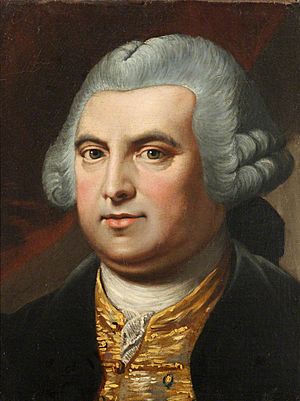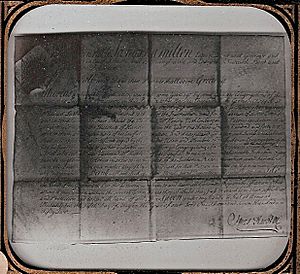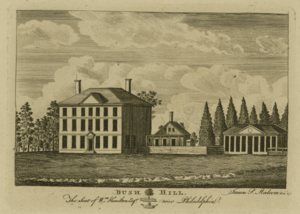James Hamilton (Pennsylvania politician) facts for kids
Quick facts for kids
James Hamilton
|
|
|---|---|
 |
|
| Acting Governor of the Province of Pennsylvania | |
| In office 19 July – 30 August 1773 |
|
| President of the Pennsylvania Provincial Council | |
| In office 4 May – 16 October 1771 |
|
| Deputy Governor of the Province of Pennsylvania | |
| In office October 1759 – November 1763 |
|
| In office 23 November 1748 – 3 October 1754 |
|
| Member of the Pennsylvania Provincial Council | |
| In office 1746–1747 |
|
| Mayor of Philadelphia | |
| In office 1745–1746 |
|
| Member of the Pennsylvania Provincial Assembly | |
| In office 1735–1740 |
|
| Personal details | |
| Born | 1710 Philadelphia, Pennsylvania |
| Died | 14 August 1783 (aged 72–73) New York, New York |
| Occupation | Lawyer, politician |
| Signature | |
James Hamilton (1710 – 14 August 1783) was an important lawyer and government leader in colonial Philadelphia and Pennsylvania. He was the son of a famous lawyer, Andrew Hamilton. James Hamilton served as the Deputy Governor of Pennsylvania twice. His first term was from 1748 to 1754, and his second was from 1759 to 1763.
Contents
Early Life and Career
James Hamilton was born in Philadelphia in 1710. He studied in Philadelphia and England. In 1731, he became a lawyer. His father, Andrew Hamilton, was a chief court clerk for the Supreme Court of Pennsylvania. In 1733, his father stepped down, and James took over the job.
In 1734, James's father sold him the land where the town of Lancaster, Pennsylvania was located. Later that month, James got official permission from the Penn family for this land.
When his father died in 1741, James Hamilton inherited a large property called Bush Hill. It was located north of Philadelphia. He also helped manage lands his father bought for the state house and nearby public areas.
Public Service in Philadelphia
From 1735 to 1740, Hamilton was a member of the provincial assembly. This was like a local government group. He also served as mayor of Philadelphia for one year, starting in October 1745.
As mayor, Hamilton kept records of servants and apprentices. These records help historians understand how many people worked as indentured servants in Philadelphia. Indentured servants were people who agreed to work for a period of time to pay for their journey to America.
In 1746, Hamilton joined the Pennsylvania Provincial Council. This was another important government group. The sons of William Penn, who owned Pennsylvania, chose him to be the lieutenant-governor. He served in this role from 1748 to 1754, and again from 1759 to 1763. He also served briefly in 1771 and 1773.
In 1761, Hamilton and William Allen officially transferred the land for the Philadelphia state house to Isaac Norris II and other trustees. This completed the area around the state house and its public spaces.
Later, when the United States government was based in Philadelphia, Hamilton was in England. He rented his Bush Hill estate to the government. The vice-president used it as his home.
Serving as Deputy Governor

In 1748, while visiting London, James Hamilton was chosen by the Penn family to be the Deputy Governor of Pennsylvania. When he returned to Philadelphia, he faced challenges with Native American groups. Settlers were moving onto their lands illegally, north of the Blue Mountains. Hamilton allowed officials to remove these settlers by force if needed.
Hamilton also dealt with other big issues:
- The French military was building forts on Pennsylvania's land. These forts were at places like Presque Isle and Duquesne.
- He needed to organize and pay for defenses against the French. This was difficult because many Quakers in the Assembly did not believe in war.
- There were disagreements between the Assembly and the Penn family about taxing the Penns' land.
- The Assembly was unhappy because the Penn family would not listen to their appeals about the Deputy Governor's decisions.
- Hamilton did not tell the Assembly about the Penn family's rules regarding money bills he had to approve.
- He attended the Albany Congress with John Penn and Benjamin Franklin. This meeting suggested that the colonies should unite to defend themselves against the French and Native Americans.
Hamilton eventually resigned because his relationship with the Assembly became very difficult. He was trying to follow the Penn family's instructions.
Hamilton's second time as Deputy Governor began after William Denny was removed from office. The French and Indian War was ending. However, Pennsylvania then faced Pontiac's War. Delaware and Shawnee warriors attacked settlements in Pennsylvania, taking captives and killing people. A group of settlers called the Paxton Boys also caused trouble in the colony. Hamilton was later replaced by John Penn, who was William Penn's grandson.
Leading the Provincial Council
From May 4 to October 16, 1771, James Hamilton acted as the chief leader of the province. This happened when John Penn went back to England after his father died. The council could not approve any new laws during this time. So, Hamilton's role was mostly ceremonial until October. Then, Richard Penn, Jr., John's brother, was appointed Deputy Governor.
Hamilton also served as Acting Governor from July 19 to August 30, 1773.
Death and Lasting Impact

James Hamilton passed away in New York City on August 14, 1783.
He helped start several important organizations in Philadelphia. He was the president of the board of trustees for the College of Philadelphia, which is now the University of Pennsylvania. He also led the American Philosophical Society, a group that promotes knowledge and science.
James Hamilton did not have any sons who survived him. So, his nephew, William Hamilton, inherited his Bush Hill estate.
During the Yellow fever epidemic of 1793, some buildings at Bush Hill were used as a hospital for people with the fever.
 | Kyle Baker |
 | Joseph Yoakum |
 | Laura Wheeler Waring |
 | Henry Ossawa Tanner |

